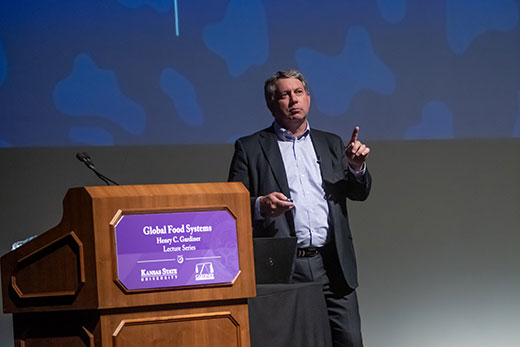
Kansas native Gregg Doud delivered the 2023 Henry C. Gardiner Global Food Systems lecture Oct. 9 at Kansas State University. | Download this photo.
Doud casts positive outlook for United States agriculture
Native Kansan outlines opportunities during Henry C. Gardiner lecture at K-State
Oct. 10, 2023
By Pat Melgares, K-State Research and Extension news service
See the full video of Gregg Doud's Oct. 9 presentation online
MANHATTAN, Kan. – A former U.S. ambassador who helped to negotiate an iconic agricultural trade agreement with China said that America’s farmers have a bright future if the industry can capitalize on available opportunities for exports, technology and value-added products.
But Gregg Doud – currently the president and Chief Executive Officer of the National Milk Producer’s Federation – said each has its own set of challenges as the U.S. balances world politics and intense competition in the global food market.
“You live in a world today, folks, where total U.S. agricultural exports to the world are about the same as China’s total food imports from the world,” said Doud, in remarks as the 10th speaker in Kansas State University’s Henry C. Gardiner Global Food Systems lecture series on Oct. 9.
China, he said, imported $236 billion in agricultural commodities in 2022, while the United States exported $196 million. “What happens in China in terms of food dictates everything else in the rest of the world,” Doud said.
For example, China produces nearly half of all hogs in the world today. In 2020, the practice of feeding food scraps to pigs (known as swill feeding) was banned, which meant China suddenly became the biggest corn importer in the world.
Doud also noted that Chinese consumers love meat: “China is cleaning the world out of beef,” he said. “In August, they purchased an all time record high in beef imports from the world.”
Those facts speak to what the next decade could look like for U.S. beef producers, Doud said. “In no way, shape or form does the supply of animal protein in the world come anywhere near meeting the demand,” he said. “And if you look around the world, what do you see; who else in the world can make more animal protein. It sure is not going to be the Europeans…the Chinese, Japanese or Asians.”
The same is true, he noted, for the dairy industry in the United States.
“Folks, the only place on Earth that can come even close to (meeting future demand) is the United States. So, I say, let’s go. Let’s get in on this; this is the future. This is where it’s at.”
Doud said Brazil is dominating corn and soybean production, but an area in which the U.S. can succeed is in producing soybeans for renewable diesel fuel, as opposed to food.
“In the near future, we are going to be making a whole lot more soybean oil – crushing it for oil, actually, rather than for the meal. And we are going to have a mountain of soybeans to the point where I heard a conversation the other day that we could be looking at soybean meal at $150 (a tonne).”
“For agriculture in this country, that’s interesting.”
Doud also touched on numerous technology advancements in agriculture, including biosensing and spraying technology, robotics in the dairy industry, genomics, autonomous semis that could cut transportation costs by 70%, and many more.
“The technology that we have coming in agriculture is unbelievable,” he said, but added that “we can’t get the (government) to approve some of our technology, which means the guys that invested in the technology can’t get it commercialized.”
“This is a holdup for our country. We have got to get our government to the point where they approve this technology so we can move forward.”
Born in Mankato, Kansas, Doud earned undergraduate and graduate degrees from Kansas State University before embarking on a career that includes serving as a market analyst for U.S. Wheat Associates; chief economist for the National Cattlemen’s Beef Association; and president of the Commodity Markets Council.
Between 2020 and August of this year, Doud was vice president of global situational awareness and chief economist with Aimpoint Research, a global, strategic alliance that specializes in agri-food. He was also a senior staff member of the U.S. Senate Agriculture Committee that wrote the 2012 Senate Farm Bill.
His full talk – titled ‘The Future of Agricultural Trade, Geopolitics and Food’ – is available to view online.
Kansas State University established the Henry C. Gardiner Global Food Systems lecture series to provide science-based education about world food issues. The series allows students, faculty, staff and Kansas citizens to interact with U.S. and international food industry leaders on topics of current interest.
The lecture series is funded by the Gardiner family of Ashland, Kan. Henry C. Gardiner, who passed away just days before the first lecture in 2015, was known as a visionary leader who dedicated his career to improving the beef industry through science and technology.
More information on the lecture, as well as videos of past speakers, is available online.

